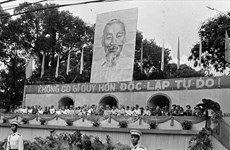ASEAN, India pledge to accelerate ties
A Commemorative Summit took place to mark the 20th anniversary of ASEAN-India partnership.
Leaders of India and ASEAN member countries highlighted the strong
development and important results of the ASEAN-India partnership over
the past 20 years at the Commemorative Summit to mark the partnership’s
20 th anniversary in New Delhi on December 20.
Indian Prime Minister Manmohan Singh affirmed that India always attaches importance to strengthening the relationship and cooperation with ASEAN in all fields, adding that ASEAN will continue to be a key pillar in India ’s “Look East” policy.
Two-way trade between the Association of Southeast Asian Nations (ASEAN) and India reached 74.9 billion USD last year, up 43 percent over the previous year and even exceeding the goal of 70 billion USD in trade set earlier for 2012.
India is now the sixth largest trade partner of ASEAN. The two sides have also reached an agreement to conclude the negotiations for agreements in trade, services and investment towards a comprehensive free trade area.
The ASEAN leaders highly valued the effective cooperation that India has made with the grouping in strengthening regional connectivity and linkage and building an ASEAN Community.
The Summit adopted a Declaration of Vision which decides to lift bilateral ties to strategic partnership level. The document also defines major directions for the development of the ASEAN-India relations and the effective and full implementation of their cooperation in various fields ranging from politics, security to culture, society and development cooperation.
The two sides affirmed their determination to fulfill the goal of 100 billion USD in two-way trade by 2015, and decided to sign the agreements on trade, services and investment on an early date.
They also reach high consensus on actively participating in the negotiations for a Regional Comprehensive Economic Partnership (RCEP), fostering linkages in the fields of air, sea and land transport, digital technology, and the building of a Mekong-India Economic Corridor.
The two sides also agreed to cooperate in developing small- and medium-sized enterprises, human resources development, and coping with challenges in climate change, food and energy security, urbanisation, natural disaster management and drug fighting.-VNA
Indian Prime Minister Manmohan Singh affirmed that India always attaches importance to strengthening the relationship and cooperation with ASEAN in all fields, adding that ASEAN will continue to be a key pillar in India ’s “Look East” policy.
Two-way trade between the Association of Southeast Asian Nations (ASEAN) and India reached 74.9 billion USD last year, up 43 percent over the previous year and even exceeding the goal of 70 billion USD in trade set earlier for 2012.
India is now the sixth largest trade partner of ASEAN. The two sides have also reached an agreement to conclude the negotiations for agreements in trade, services and investment towards a comprehensive free trade area.
The ASEAN leaders highly valued the effective cooperation that India has made with the grouping in strengthening regional connectivity and linkage and building an ASEAN Community.
The Summit adopted a Declaration of Vision which decides to lift bilateral ties to strategic partnership level. The document also defines major directions for the development of the ASEAN-India relations and the effective and full implementation of their cooperation in various fields ranging from politics, security to culture, society and development cooperation.
The two sides affirmed their determination to fulfill the goal of 100 billion USD in two-way trade by 2015, and decided to sign the agreements on trade, services and investment on an early date.
They also reach high consensus on actively participating in the negotiations for a Regional Comprehensive Economic Partnership (RCEP), fostering linkages in the fields of air, sea and land transport, digital technology, and the building of a Mekong-India Economic Corridor.
The two sides also agreed to cooperate in developing small- and medium-sized enterprises, human resources development, and coping with challenges in climate change, food and energy security, urbanisation, natural disaster management and drug fighting.-VNA











